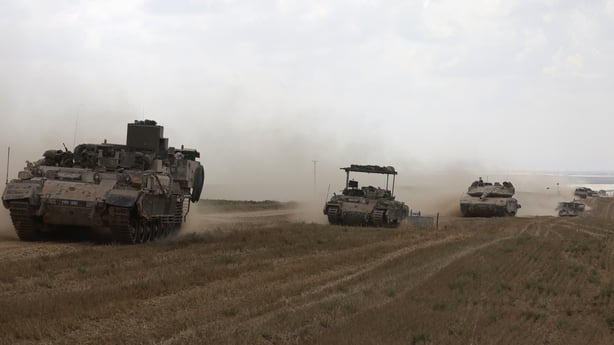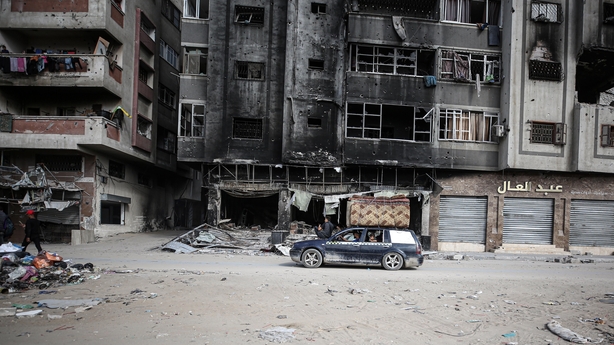Remarks by US President Joe Biden that a ceasefire in Gaza would be possible if Hamas released its hostages are a "setback" to negotiations, the Palestinian militant group has said.
"We condemn this position by the US president, we consider it a setback from the outcomes of the latest round of negotiations, which led to the movement's agreement to the proposal put forward by mediators," Hamas said in a statement.
Mr Biden said yesterday that a ceasefire in the Israel-Hamas war would be possible "tomorrow" if Hamas gave up hostages seized in its 7 October attack.
The US president raised the topic of the hostages during a speech in Seattle after warning Israel he would stop supplying artillery shells and other weapons if it sends ground troops into the city of Rafah.
Negotiations between Hamas and Israel for a truce and hostage exchange deal, mediated by Egypt, Qatar and the United States, appear to have stalled amid Israeli military action in the southern Gaza city.
Hamas said Israeli Prime Minister Benjamin Netanyahu had "rushed to overturn" the talks by launching an offensive in Rafah.
The militant group accused the Israeli government of "escalating their brutal massacres in various areas of the Gaza Strip" and "reaffirming their pursuit of continuing the genocidal war in Gaza".
Israel defied international opposition this week and sent tanks and troops into eastern Rafah, effectively shutting a key aid crossing.
The Israeli military expanded an evacuation order for eastern Rafah yesterday and said 300,000 Palestinians had left the area.

Meanwhile, US Secretary of State Antony Blinken has said Israel lacked a "credible plan" to protect some 1.4 million Palestinian civilians in Rafah and warned an Israeli attack could create an insurgency by failing to kill all Hamas fighters in the southern Gazan city.
"Israel is on a trajectory potentially to inherit an insurgency with many armed Hamas fighters left or if it leaves a vacuum filled by chaos, filled by anarchy and probably refilled by Hamas," Mr Blinken said on NBC's Meet the Press.
Hamas fighters, he said, are returning to northern Gaza areas that Israel claimed to have cleared and an assault on Rafah "risks doing terrible harm to civilians" without ending the Hamas presence there.
Israel's planned invasion of Rafah has helped fuel the deepest tensions in relations between Israel and its main ally in generations.
NBC and CBS News aired interviews with Mr Blinken dominated by US President Joe Biden's decision to pause a shipment to Israel of bombs over fears of massive civilian casualties in Rafah and a State Department report that Israel's use of U S-supplied armsmay have broken international law.
The report, which was unrelated to the bomb shipment, found no specific violations justifying withholding US military aid, saying the chaos of war prevented verification of alleged individual breaches.
Hamas' use of civilian infrastructure and tunnels "makes it very difficult to determine, particularly in the midst of war," what happened in specific instances, Mr Blinken said, defending the report criticised by some politicians of Mr Biden's Democratic Party and human rights groups.
Appearing after Mr Blinken on NBC, Democratic Senator Bernie Sanders rejected the report, saying that "any observer knows Israel has broken international law" and "should not be receiving another nickel in US military aid".
Republican Senator Lindsey Graham, interviewed on the same program, called Mr Biden's postponing the bombs "the worst decision in the history of the US Israeli relationship".
"Give Israel the bombs they need to end the war they can't afford to lose, and work with them to minimise casualties," he said.
Defending the pause on the supply of 3,500 2,000-pound and 500-pound bombs, Mr Blinken said Israel lacked a "credible plan" to protect some 1.4 million civilians sheltering in Rafah.
He told CBS that the shipment was the only US weapons package being withheld.
But that could change, he said, if Israel launches a full-scale attack on Rafah, which Israel says it plans to invade to root out entrenched Hamas fighters.
If Israel "launches this major military operation to Rafah, then there are certain systems that we're not going to be supporting and supplying for that operation," said Mr Blinken.
Israel needs to "have a clear, credible plan to protect civilians, which we haven't seen," he said.
Most of the 1.4 million Palestinians in Rafah were displaced from elsewhere by fighting and Israeli bombardments that have devastated the seaside enclave.
Israel also has not developed a post-war plan for Gaza's security, governance and reconstruction, Mr Blinken said, adding on CBS that the US is working on such a plan with Arab governments and others.
"We have the same objectives as Israel. We want to make sure that Hamas cannot govern Gaza again," he said, adding that the United States has been discussing with Israel "a more effective, durable way" of demilitarising Gaza and finding Hamas' leaders.
Israel's military operation in Gaza has killed at least 35,000 Palestinians, according to Gaza's Hamas-run health ministry.
The war was prompted by the 7 October Hamas-led attack on Israel in which some 1,200 people were killed and more than 250 people taken hostage, according to Israeli tallies.
Israel says 620 soldiers have been killed.
The UN human rights chief has insisted that a full-scale Israeli assault on the southern Gaza city "cannot take place", adding that it could not be reconciled with international law.
"The latest evacuation orders affect close to a million people in Rafah. So where should they go now? There is no safe place in Gaza!" Volker Turk, the UN high commissioner for human rights, said in a statement.
"These exhausted, famished people, many of whom have been displaced many times already, have no good options."

He said a full-scale offensive could have a "catastrophic impact... including the possibility of further atrocity crimes."
Mr Turk also voiced concern at reports of indiscriminate rocket fire from Gaza.
He said a full scale offensive on Rafah "cannot take place" and called on all states with influence to do everything in their power to prevent it.
He also called on Israel and Palestinian armed groups to agree a ceasefire, and for all hostages to be released immediately.
Mr Turk's comments come after UN Secretary-General Antonio Guterres urged an immediate halt to the Israel-Hamas war in Gaza, the return of hostages and a "surge" in humanitarian aid to the besieged Palestinian territory.
Earlier, the evacuation order by Israel was described as "unacceptable" by European Council President Charles Michel.
In a post on X, he said: "We call on the Israeli government to respect international humanitarian law and urge not to undertake a ground operation in Rafah."
Health officials in Gaza have said that Israel sent tanks into eastern Jabalia in northern Gaza early this morning, after a night of heavy aerial and ground bombardments, killing 19 people and wounding dozens of others.
Jabalia is the biggest of Gaza's eight historic refugee camps and is home to more than 100,000 people, most of whom were descendants of Palestinians who were driven from towns and villages in what is now Israel during the 1948 Arab-Israeli war that led to the creation the state of Israel.
Late last night, the Israeli military said forces operating in Jabalia are preventing Hamas, which controls Gaza, from re-establishing its military capabilities there.
"We identified in the past weeks attempts by Hamas to rehabilitate its military capabilities in Jabalia. We are operating there to eliminate those attempts," said Rear Admiral Daniel Hagari, Israel's military spokesperson, during a briefing to reporters.
Mr Hagari also said that Israeli forces operating in Gaza City's Zeitoun district killed about 30 Palestinian militants.
Gaza's bloodiest-ever war began following Hamas's unprecedented 7 October attack on Israel that resulted in the deaths of more than 1,170 people, mostly civilians, according to an AFP tally of Israeli official figures.
During their attack, militants also seized hostages. Israel estimates 128 captives remain in Gaza including 36 who the military says are dead.
Vowing to destroy Hamas, Israel has conducted a retaliatory offensive that has killed nearly 35,000 people in Gaza, mostly women and children, according to the Hamas-run territory's health ministry.
Fractious Israeli relations pose election risk for Biden
